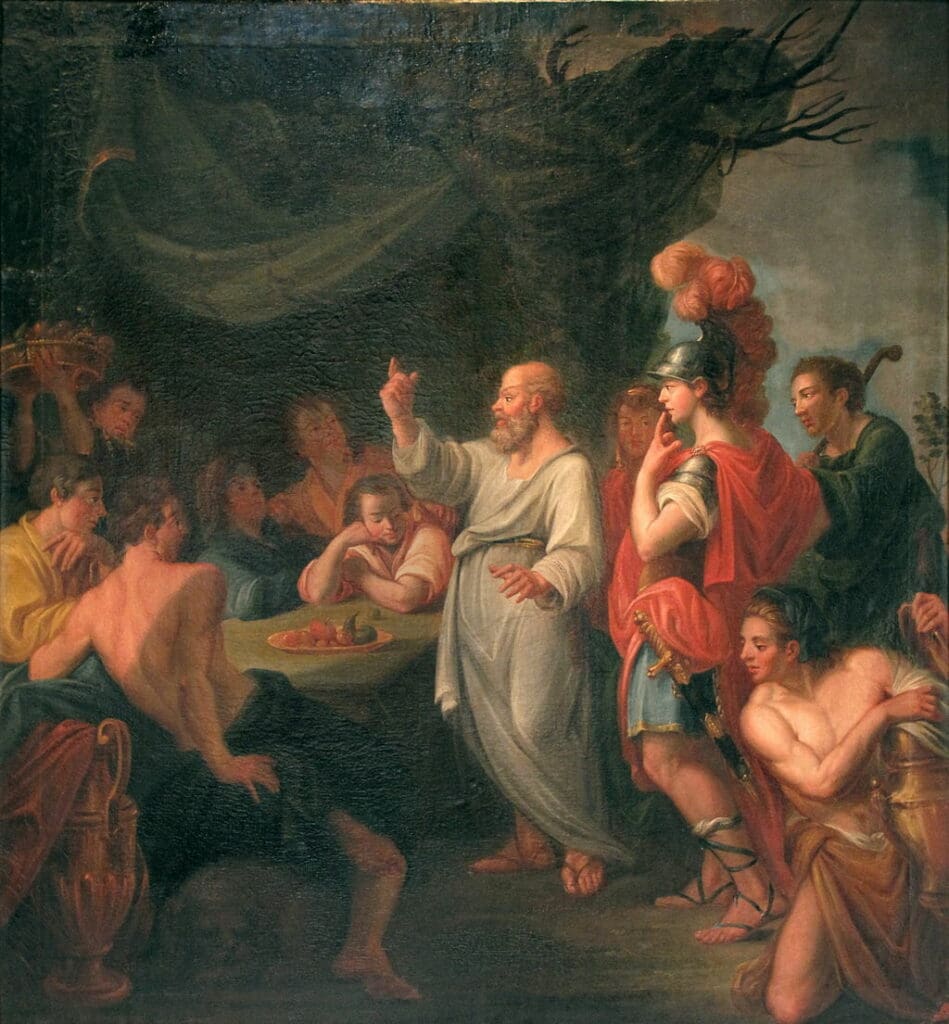Top 15 intriguing facts about Socrates
*Originally published by Angelah in March 2020 and updated by Vanessa R in August 2022 and Updated by Vanessa R in August 2023
Socrates. You must have heard of the ancient philosopher from the Classical Greek school. Or maybe ‘What I do not know, I do not think I know’ or, ‘I know that I know nothing’; these are the words of Socrates, yes he was the one who liked Epistemology and Ethics. He was born around 470-469 BC, in Athens, Greece.
He believed that the mind was more important than physical beauty, maybe because of his appearance, which according to his student Plato, did not qualify him as an Athenian Greek god. He was said to be extremely ugly. You see, Socrates was a short man with bulging eyes and a snub nose!
His students included Aristotle, Plato, Xenophon, and Aristophanes, some of the most brilliant minds in history. that should tell you that he was a great man.
Below are some facts that will interest you about one of the greatest philosophers on this planet!
1. He was of middle economic status
Socrates was not born into nobility he had very minimal Greek education and learned masonry from his father at a tender age. He found it hard to be a philosopher because he had no money. His father Sophroniscus was a sculptor and a mason and his mother Phaenarete was a midwife.
2. He made money from teaching
Many believe that Socrates did not make money from teaching, though some people say that his main source of money, especially in the early days, were from teaching. He also practiced his father’s trade of sculpting and masonry and practiced in for many years.
3. No belief in religion
Socrates was not a fan of religion; in fact, he attracted many enemies because he tried to convert young people from religion. He did not believe in theological belief, instead choosing ethics –like friendship- deeming them as key over religion. His charges included not recognizing the gods that the city worshipped and introducing new divinities by corrupting the youth.
Socrates believed in a divinity called diamon, which was unfamiliar and unlicensed in Athens, this is what caused his execution after being accused of impiety. You see, Athenians were polytheistic, a concept which means that gods were created, and did not create the world.
They were therefore seen as power-hungry super-beings who were feared for meddling with societal affairs. Athenians, therefore, offered sacrifices and rituals through ceremonies to them to appease them. Socrates did not believe in that, which caused him trouble. He believed the divine to be benevolent, authoritative, rational and wise.
4. He died of hemlock poisoning
His friends wanted to bribe the guards so that Socrates could escape his death; he was sentenced to hemlock poisoning, but he said it would show he was afraid of death and he was not, and he wouldn’t be a real philosopher if he escaped! He said that his soul would leave his body soon before his execution, so he chose to stay instead!
5. He did not leave any recorded teachings behind
His discoveries and teachings on epistemology were recorded and taught by his students Xenophon and Plato. He did not leave any recordings behind. He simply pondered upon thoughts daily.
6. Famous teacher
So great was his work, that Socrates is known to have taught Alexander the Great- between 356-323 BCE, Plato, Aristotle and many more. He openly objected to the democracy that ran Athens, believing that ‘ideals belong in a world only the wise man can understand.
His Socratic questioning shows six types of questioning: conceptual clarification questions, probing assumptions, probing rationale, reason, and evidence; questioning viewpoints and perspectives, probing implications and consequences and questions about the question.
7. Know thyself
Socrates had a motto- Know thyself, which meant that people ought to examine their lives. He came up with the Socratic questioning, which meant he taught by drawing answers from his pupils. he meant to challenge the accuracy and completeness of thinking; a way which was meant to push people to achieve their ultimate goals. He was known for his unconventionality and how frugally he lived his life.
8. Socrates was a soldier!
A war would be something that was against Socrates’ philosophies going by his teachings, but he took the compulsory military service training and served in the military during the Peloponnesian War, the battle of Amphipolis, and the battle of Potidaea; he saved the life of the Athenian General Alcibiades.
9. He might have been a Democrat!
Many things point to Socrates have been a democrat, for example, he served in the military, refused to aid in the finding of the democratic General, Leon who was supposed to be executed and had a lot of people who were democrats as his disciples. He even refused to flee his execution at the age of 70 saying that he lived in agreement with the laws of democracy! His death was more likely due to his anti-religion lessons which were meant to dissuade the youth from religion.
10. He was openly bisexual!
Socrates was married to a woman Xanthippe and even had children- Menexenus, Lamprocles, and Sophroniscus, but he was known to be openly bisexual, often claiming to be attracted to younger men.
He said that he was more attracted to them by their refined souls and not their physical selves. Socrates was actually in love with the Athenian general Alcibiades!
11. The Socratic method was genius

Socrates Address by Louis Joseph LeBrun from Wikimedia Commons
Socrates favoured a much more interesting method of exploring difficult issues than penning boring philosophical treatises or lecturing pupils on the nature of knowing. In Athens’ crowded outdoor market, the Agora, he would loiter about all day and chitchat with passersby.
Whether they were young, elderly, male, female, politicians, or prostitutes, nobody was safe from Socrates’ humorous interrogations. Crowds of young Athenians would come to see Socrates employ his biting wit and unflappable logic to corner his victims in their own minds. The victim should be as haughty and snobbish as possible.
Some victims of Socratic shakedowns left angry, while others had undergone a transformation. Young poet Aristocles went home and set all of his plays and poetry on fire after seeing Socrates’ spectacle in the marketplace. That youngster would grow up to be Plato, the famous philosopher.
12. Socrates didn’t fully dismiss the supernatural

Temple of Apollo by Zde from Wikimedia Commons
Although Socrates was an ardent advocate for logic and reason, he didn’t completely reject the supernatural. One reason is that Socrates thought he was sent by the oracle of Apollo at Delphi to defend the souls of all Athenians, making his combative debates in the Agora a part of his divine mission.
Recently scholars believed that Socrates may have been schizophrenic because Socrates occasionally lost himself in his own thoughts after being extremely preoccupied with a specific subject.
The fact that Socrates’ inner voice did not warn him against attending the trial in Athens, whether due to a supernatural force or not, is one of the justifications he gives for doing so. He understood that the outcome—good or bad—would ultimately serve his interests.
13. He married an upper-class woman

Penni Socrates by Luca Penni from Wikimedia Commons
Around the age of fifty, he wed Xanthippe, a lady of the high class, and they produced three sons. Writers of the time, including Xenophon, said that these boys were exceedingly boring and nothing like their father.
Until he was informed by the Oracle at Delphi that he was the wisest of men, Socrates appears to have led a very typical existence. He began off on a path that would lead to his recognition as a philosopher and the father of Western Philosophy when he disputed the oracle’s assertion.
14. Partners in High Positions

Socrates by Internet Archive from Wikimedia Commons
According to legend, Lysimachus, the son of illustrious Athenian statesman Aristides, was close friends with Socrates’ father, the stonemason Sophroniscus. Even so, the Athenians still banished him in the 480s BC due to his stellar reputation, earning him the nickname Aristides the Just.
The relationship, however, allowed Socrates to briefly mingle with Athens’ social elite, including Pericles, who served as the city’s leader for a portion of the Peloponnesian War before his passing.
15. Socrates might have used his hands
According to legend, Socrates briefly apprenticed under his father to become a stonemason. Even Socrates being the architect of the Charites statues is one possibility. Up until the second century AD, these statues adorned the Acropolis, a holy peak in Athens.
He was indeed an interesting persona and a brilliant mind! I hope you will now understand Socrates and his works a lot better!
Socrates’ Most Memorable Quotes and Their Meaning
1.”The only true wisdom is in knowing you know nothing.”

Nicolas Guibal, CC BY-SA 2.0 FR, via Wikimedia Commons
Meaning: Socrates understood that wisdom and understanding needed humility and self-awareness. If you want to learn and be better then you need to admit your own ignorance. If you pretend to know all the answers then you’re likely to miss out on a lot of important knowledge. You can only receive true wisdom when you accept that there’s always room to learn more and by doing so you will be wiser.
2. “An unexamined life is not worth living.”
Meaning: Socrates meant that it’s important to keep auditing your life and be able to have some self-reflection. This quote makes the argument that a life that is not examined is equivalent to simply going through life and not being able to appreciate it or truly understand it. It is important to have a deep understanding of yourself and the world around you and though at times you shouldn’t take life too seriously, there are times when it’s absolutely necessary.
3. “I cannot teach anybody anything, I can only make them think.”
Meaning: Socrates’ teaching style was not the kind where he used spoon-feeding techniques, instead he promoted critical thinking and intellectual engagement. This quote emphasizes the importance of self-discovery and the use of independent thinking. This quote is even more important for teachers because they are tasked with the responsibility of pushing students to think about things critically and encouraging them to question everything and arriving at their own conclusions rather than only feeding them facts.
Planning a trip to Paris ? Get ready !
These are Amazon’s best-selling travel products that you may need for coming to Paris.
Bookstore
- The best travel book : Rick Steves – Paris 2023 – Learn more here
- Fodor’s Paris 2024 – Learn more here
Travel Gear
- Venture Pal Lightweight Backpack – Learn more here
- Samsonite Winfield 2 28″ Luggage – Learn more here
- Swig Savvy’s Stainless Steel Insulated Water Bottle – Learn more here
Check Amazon’s best-seller list for the most popular travel accessories. We sometimes read this list just to find out what new travel products people are buying.













